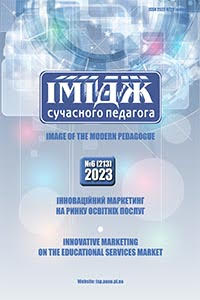Створення хмарного середовища вивчення математичного інструментарію Data Science
DOI:
https://doi.org/10.33272/2522-9729-2023-6(213)-18-24Ключові слова:
хмарні технології; онлайн-освіта; Data Science; soft skills; навчання впродовж життяАнотація
Статтю присвячено дослідженню та класифікації можливостей хмарних сервісів і ресурсів реалізації математичного інструментарію Data Science в умовах розвитку технологій онлайн-навчання. Метою дослідження цього питання – розкрити потенціал хмарних цифрових інструментів в освітньому процесі та визначити їх переваги в онлайн-навчанні за умов динамічного зовнішнього середовища. Аналіз попередніх досліджень щодо проблеми, що розглядається, виявив низку невирішених питань у даній предметній області. В якості основного елемента структури хмарного середовища пропонується використання хмарного засобу Google Colab. У роботі розглядаються принципи кооперації Google Colab із можливостями наукових бібліотек Python і таких солверів як OR-tools Google Colab та інших. Застосування даного підходу уможливлює досліднику даних зосередитися на етапі моделювання задачі, тоді як процес кодування значно спрощується.
Посилання
Пономарьов О. С. Реалізація можливостей цифрових освітніх сервісів і ресурсів в умовах розвитку технологій змішаного навчання. Педагогічні науки: теорія та практика. 2023. № 2. С. 136–140.
Роганов М. Л. Використання хмарних технологій у процесі професійної підготовки майбутніх вчителів інформатики. Духовність особистості: методологія, теорія і практика. 2018. № 4 (85). C. 198–205.
Akimov N., Kurmanov N., Uskelenova A., Aidargaliyeva N., Mukhiyayeva D., Rakhimova S., Raimbekov B., Utegenova Z. Components of education 4.0 in open innovation competence frameworks: Systematic review. Journal of Open Innovation: Technology, Market, and Complexity. 2023. Vol. 9, № 2. 100037.
Dhar V. Data Science and Prediction. Communications of the ACM. 2013. Vol. 56, № 12. P. 64–73.
Four-Dimensional Education: The Competencies Learners Need to Succeed. URL: https://curriculumredesign.org/our-work/four-dimensional-21st-century-education-learning-competencies-future-2030/ (дата звернення 10.10.2023).
Google Colaboratory. URL: https://colab.research.google.com. (дата звернення 10.10.2023).
Google’s new ‘Seedbank’ is home to ML project examples for developers to run & edit. URL: https://9to5google.com/2018/07/16/seedbank-google-machine-learning -tensorflow/ (дата звернення 10.10.2023).
Online Education – Worldwide. URL: https://www.statista.com/outlook/dmo/ eservices/online-education/worldwide#revenue (дата звернення 10.10.2023).
Route. Schedule. Plan. Assign. Pack. Solve. OR-Tools is fast and portable software for combinatorial optimization. URL: https://developers.google.com/optimization (дата звернення 10.10.2023).
Smaldone F., Ippolito A., Lagger J., Pellicano M. Employability skills: Profiling data scientists in the digital labour market. European Management Journal. 2022. Vol. 40, № 5. P. 671–684.
Stodden V. The Data Science Life Cycle: A Disciplined Approach to Advancing Data Science as a Science. Communications of the ACM. 2020. Vol. 63, № 7. P. 58–66.
Thwe W. Ph., Kálmán A. The regression models for lifelong learning competencies for teacher trainers. Heliyon. 2023. Vol. 9, № 2. P. 13749.
50 Online Education Statistics: 2023 Data on Higher Learning & Corporate Training. URL: https://research.com/education/online-education-statistics (дата звернення 10.10.2023).
References
Ponomarov, O. S. (2023). Realizatsiia mozhlyvostei tsyfrovykh osvitnikh servisiv i resursiv v umovakh rozvytku tekhnolohii zmishanoho navchannia [Realization of the possibilities of digital educational services and resources in the conditions of the development of mixed learning technologies]. Pedahohichni nauky: teoriia ta praktyka [Pedagogical sciences: theory and practice], 2, 136-140 [in Ukrainian].
Rohanov, M. L. (2018). Vykorystannia khmarnykh tekhnolohii u protsesi profesiinoi pidhotovky maibutnikh vchyteliv informatyky [The use of cloud technologies in the process of professional training of future computer science teachers]. Dukhovnist osobystosti: metodolohiia, teoriia i praktyka [Personal spirituality: methodology, theory and practice], 4 (85), 198-205 [in Ukrainian].
Akimov, N., Kurmanov, N., Uskelenova, A., Aidargaliyeva, N., Mukhiyayeva, D., Rakhimova, S., Raimbekov, B., & Utegenova, Z. (2023). Components of education 4.0 in open innovation competence frameworks: Systematic review. Journal of Open Innovation: Technology, Market, and Complexity, 9, 2, 100037.
Dhar, V. (2013). Data Science and Prediction. Communications of the ACM, 56, 12, 64-73.
Four-Dimensional Education: The Competencies Learners Need to Succeed. Retrieved from https://curriculumredesign.org/our-work/four-dimensional-21st-century-education-learning-competencies-future-2030/.
Google Colaboratory. Retrieved from https://colab.research.google.com.
Google’s new ‘Seedbank’ is home to ML project examples for developers to run & edit. Retrieved from https://9to5google.com/2018/07/16/seedbank-google-machine-learning -tensorflow/
Online Education – Worldwide. Retrieved from https://www.statista.com/outlook/dmo/ eservices/online-education/worldwide#revenue
Route. Schedule. Plan. Assign. Pack. Solve. OR-Tools is fast and portable software for combinatorial optimization. Retrieved from https://developers.google.com/optimization
Smaldone, F., Ippolito, A., Lagger, J., & Pellicano, M. (2022). Employability skills: Profiling data scientists in the digital labour market. European Management Journal, 40, 5, 671-684.
Stodden, V. (2020). The Data Science Life Cycle: A Disciplined Approach to Advancing Data Science as a Science. Communications of the ACM, 63, 7, 58-66.
Thwe, W. Ph., & Kálmán, A. (2023). The regression models for lifelong learning competencies for teacher trainers. Heliyon, 9, 2, 13749.
50 Online Education Statistics: 2023 Data on Higher Learning & Corporate Training. Retrieved from https://research.com/education/online-education-statistics
##submission.downloads##
Опубліковано
Як цитувати
Номер
Розділ
Ліцензія
Авторське право (c) 2023 Імідж сучасного педагога

Ця робота ліцензується відповідно до Creative Commons Attribution-NonCommercial-ShareAlike 4.0 International License.
Автори, які публікуються у цьому журналі, погоджуються з наступними умовами:- Автори залишають за собою право на авторство своєї роботи та передають журналу право першої публікації цієї роботи на умовах ліцензії Creative Commons Attribution License, котра дозволяє іншим особам вільно розповсюджувати опубліковану роботу з обов'язковим посиланням на авторів оригінальної роботи та першу публікацію роботи у цьому журналі.
- Автори мають право укладати самостійні додаткові угоди щодо неексклюзивного розповсюдження роботи у тому вигляді, в якому вона була опублікована цим журналом (наприклад, розміщувати роботу в електронному сховищі установи або публікувати у складі монографії), за умови збереження посилання на першу публікацію роботи у цьому журналі.
- Політика журналу дозволяє і заохочує розміщення авторами в мережі Інтернет (наприклад, у сховищах установ або на особистих веб-сайтах) рукопису роботи, як до подання цього рукопису до редакції, так і під час його редакційного опрацювання, оскільки це сприяє виникненню продуктивної наукової дискусії та позитивно позначається на оперативності та динаміці цитування опублікованої роботи (див. The Effect of Open Access).



